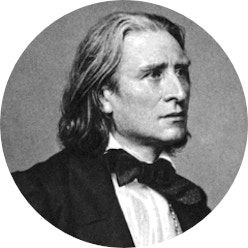
Франц Лист
22 октября 1811 г. - Raiding (Hungary) — 31 июля 1886 г. - Bayreuth (Germany)
About
Пианист, композитор, дирижёр, денди, интеллектуал и религиозный отец, Лист очаровал Европу XIX века. Будучи вундеркиндом, он учился у Черни и Сальери в Вене. Уже знаменитый в пятнадцать лет, он революционизировал фортепианную технику и установил сольный фортепианный концерт, исполняя свои оперные транскрипции, Годы странствий или Венгерские рапсодии. До 1830 года не только Германия, Швейцария, Англия и Франция, но и вся Европа знала и восхищалась Листом.
Как композитор, он открыл новые пути и надеялся, по его собственным словам, «бросить копье в неопределенное пространство будущего». Современный и революционный, музыкальный авантюрист интегрировал свои многочисленные путешествия в свое творчество, будь то фольклор или находки его современников. Между цифровым превосходством и духовной депривацией, работы Листа отражают его щедрость.
На протяжении десяти лет, начиная с 1848 года, он был капельмейстером в Веймаре, где неустанно продвигал современных композиторов, таких как Вагнер, Берлиоз и Сен-Санс, давая первые исполнения их произведений. Ведя страстную и беспокойную любовную жизнь, в 1865 году он удалился в Рим, чтобы получить тонзуру от францисканских монахов. От бурной сцены, через романтические завоевания и многочисленные путешествия, этот дикий цыган стал мистическим отцом. Его рапсодии и парафразы были преобразованы в Серые облака или Лугоубрные гондолы.
После 1870-х годов его стремление к полному отсутствию украшений характеризовалось утратой и отходом от тональности, исчерпанием тематического материала и аскетической строгостью. Чтобы открыть двери в будущее, Лист закрыл все другие возможности. Его музыка стала фрагментированной, Багатель без тональности или Крестный путь свидетельствуют о его последнем музыкальном вздохе, который, как он надеялся, приблизит его к новым горизонтам за пределами смерти.

